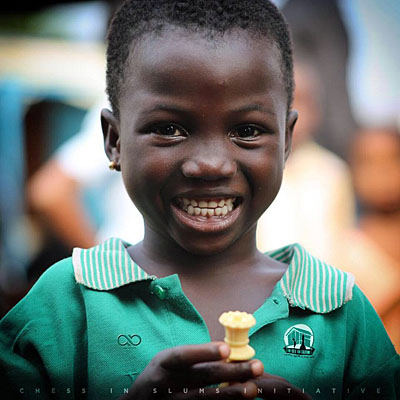Nigeria’s Basirat Ariyike… sunshine in Lagos slum









When we hear of “child prodigy” in chess, we imagine Paul Morphy, Samuel Reshevsky, Bobby Fischer, Judit Polgar or current World Champion Magnus Carlsen. In reality, there are very few that come along.
As many chess players as have graced the 64 squares, each person started at the beginning… learning that the knight moved in an “L shape” or that pawns only moved forward. Such a new discovery can provoke a lasting smile that begins a period of intrigue in chess. Such is the case of Basirat Ariyike, a little girl with a smile of sunshine.


Basirat Ariyike
Photo by Michael Ossai
She was featured is a recent web post (Dare Lasisi) which discussed a program in Lagos, Nigeria called “Chess in Slums.” Growing up in the Majidun slum community in Lagos, she was introduced to the game of chess for the very first time. Tunde Onakoya describes his interaction with a very curious 5-year old girl after a chess session.
I had told them “Chess players OBSERVE”. I had them chorus the “OBSERVE” whenever I called “Chess players” out loud. They listened with rapt attention. They learned the names of the pieces with ease. They learned how to annotate all the 64 squares on the chess board. They learned how to arrange the black and white pieces on either side. They had learned so much in just a day I was humbled. I was awed. But there was this really small girl that kept following me. She kept tugging at my trousers. I lifted her up and asked what she wanted. She pointed to the bag of chess pieces I was holding. She wanted to hold on to a piece. I smiled. She had the cutest look on her face. I gave her a queen and put her down. I watched her run off with the widest grin I had ever seen on a child’s face. She started showing off to all her friends while clinging on to it tightly.
Touching.
Is is interesting that Queen of Katwe (book, movie) was based on a similar scenario. We all know that Phiona Mutesi, who grew up in abject poverty in Uganda, was intrigued at chess while the others were more interested in getting the free soup served at the club. Phiona is now studying at Northwest University in the U.S., a long way from the slums of Katwe. It is improbable that a child come from such dire circumstances and think of anything but survival, but children have a way of keeping hope alive.
“I could not get over why this girl chose to smile so cheerfully in the midst of so much darkness and uncertainty in this world.”
What is it about chess figurines that excites children? Perhaps it is the odd, yet gallant shapes. Perhaps it is the intrigue of what these pieces may do or whether we can see ourselves in the chess army. For little Basirat, she may have found something to provide her joy. While it is too soon to bill her as a chess prodigy, we may have another example of the way chess can help chart a positive course in life.

This is revolutionary!